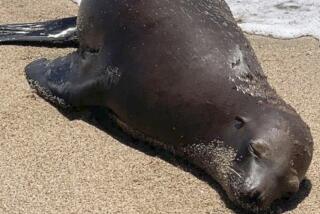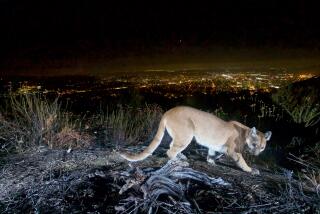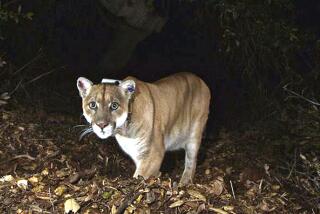Cougar Is Killed After Straying Into Villa Park
Of all the visitors that might have called on Alice Thompson early Wednesday morning, a mountain lion was probably the least expected.
The Villa Park real estate agent said she was on the phone with another agent about 7:30 when she heard a crash at her front door. She peered out to see a mountain lion--nearly 7 feet, nose to tail--on her porch.
“When I saw him, I was just shocked--I was totally shocked,” Thompson said Wednesday afternoon. “I told this other agent, ‘I’ve got to go, there’s a mountain lion at my front door.’ I still haven’t called him back, and he probably thinks I’m totally nuts.”
The cougar, weighing about 140 pounds and believed to be sick, ultimately was killed by Orange County Animal Control and sheriff’s deputies, who said they first tried to capture the animal but had to shoot it when the lion charged them.
City officials said they had never heard of a mountain lion within Villa Park’s borders but were not surprised at the encounter. Increased development, including a toll-road project, is pushing more wildlife into urban areas.
“In the hills to the east, they’re building like crazy,” said Councilwoman Patricia L. Bortle. “These animals have no place to go, so naturally they’re coming down this way.”
Authorities believe the animal was sick because witnesses said it stumbled and crashed into bushes as it walked. It also failed to scale a 5-foot fence that it should have been able to leap easily. A necropsy is scheduled.
“I didn’t want them to kill the poor thing, but I guess they had to,” Thompson said. She said she once saw a cougar shortly after she moved to Villa Park five years ago, but “it’s different when they’re at the front door.”
Wild animals are no strangers to Villa Park residents. The city has waged an ongoing battle over coyotes that slink in from the hillside and attack and kill dogs and cats. But officials said Wednesday that a mountain lion sighting is rare indeed.
“It’s an area problem; it’s not a city problem,” said Mayor Richard A. Freschi. Increased construction, he said, was causing wildlife to venture into populated areas throughout the region.
Residents have complained to officials, some urging that the coyotes be trapped and killed.
As an alternative, Stuart R. Ellins, a behavioral psychologist at Cal State San Bernardino, applied in March for a research permit to use lithium chloride to deter coyotes. Dog and cat carcasses would be laced with the chemical, which makes coyotes sick.
Ellins is waiting for approval.
More to Read
Sign up for Essential California
The most important California stories and recommendations in your inbox every morning.
You may occasionally receive promotional content from the Los Angeles Times.










